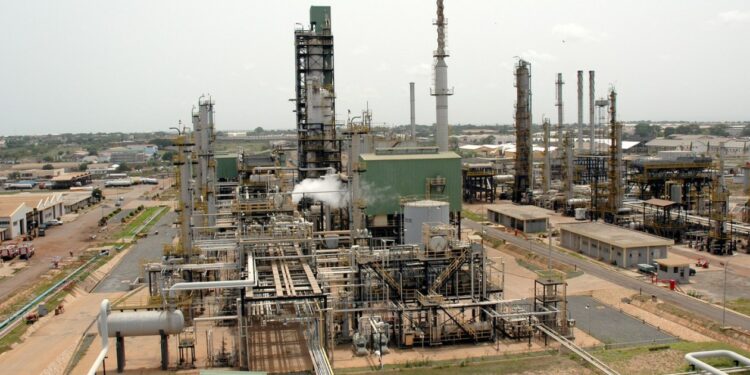Tema Oil Refinery Faces Crisis as Equity Plummets by 135% to GSH 5.7 Billion
The Tema Oil Refinery (TOR), Ghana’s flagship petroleum processing facility, has reported a dramatic decline in equity, falling from GH¢2.4 billion in 2019 to a deficit of GH¢5.7 billion in 2023. This represents a staggering 135% contraction, casting doubt on the refinery’s financial sustainability and operational viability.
The ongoing crisis, highlighted in a statement by the Centre for Environmental Management and Sustainable Energy (CEMSE) on January 23, 2025, underscores the challenges confronting the state-owned entity. Despite its historical importance as a key player in Ghana’s energy sector, TOR’s financial performance has been marred by persistent losses and structural inefficiencies.
Persistent Losses Weigh Heavily
Since 2019, TOR has recorded average annual losses of GH¢793 million, with net losses reaching GH¢1.6 billion in 2022 and GH¢1.3 billion in 2023. These figures reflect not only declining profitability but also negative returns on assets, pointing to systemic weaknesses in financial management.
Founded as the Ghanaian Italian Petroleum Company (GHAIP), TOR initially operated as a tolling refinery, processing crude oil for multinational clients. Over time, its scope broadened to include petroleum product importation, storage, and distribution, as well as laboratory services. However, operational expansions have failed to translate into financial stability.
Overstaffing and Resource Drain
Exacerbating TOR’s financial woes is an inefficient workforce structure. The refinery currently employs over 750 staff, despite operational requirements for only 150 workers. This overstaffing has placed additional pressure on an already strained financial position, necessitating urgent reforms to streamline operations.
Recommendations for Revival
CEMSE has outlined three strategic options to address TOR’s precarious situation:
- Filing for Bankruptcy
A bankruptcy filing could provide a pathway for court-supervised restructuring. This would allow TOR to suspend operations temporarily, renegotiate debts, and rationalize its workforce. Such an approach aims to prevent further financial deterioration while laying the groundwork for sustainable operations. - Liquidity Injection and Debt Restructuring
The government could commit to a targeted liquidity injection to stabilize the refinery. In tandem, debt extensions or debt-for-equity swaps could be pursued, enabling creditors to acquire partial ownership while enhancing corporate governance and asset management. - Private Sector Concessions
Under a concession model, private investors would be granted the right to operate and manage TOR for a defined period. This would leverage private capital and expertise to improve efficiency while retaining state ownership. To succeed, such agreements would require rigorous structuring and oversight to safeguard public interests.
Future Outlook
The fate of TOR is critical to Ghana’s energy strategy, with implications for fuel security and economic stability. However, its ongoing losses, coupled with operational inefficiencies, pose significant risks to its survival.
Analysts warn that without decisive action, TOR may continue to drain public resources while delivering diminishing returns. As the government weighs its options, the urgency for reform has never been greater.









how can something plummet from 3.4 to 5.7 Mr writer. who told you we have 750 workers. and where from your basis of 150people being enough to run the place. do you know the number of departments in the refinery. you call a company that has not refined but has paid all his bills both statutory and recurrent without fail since 2019.